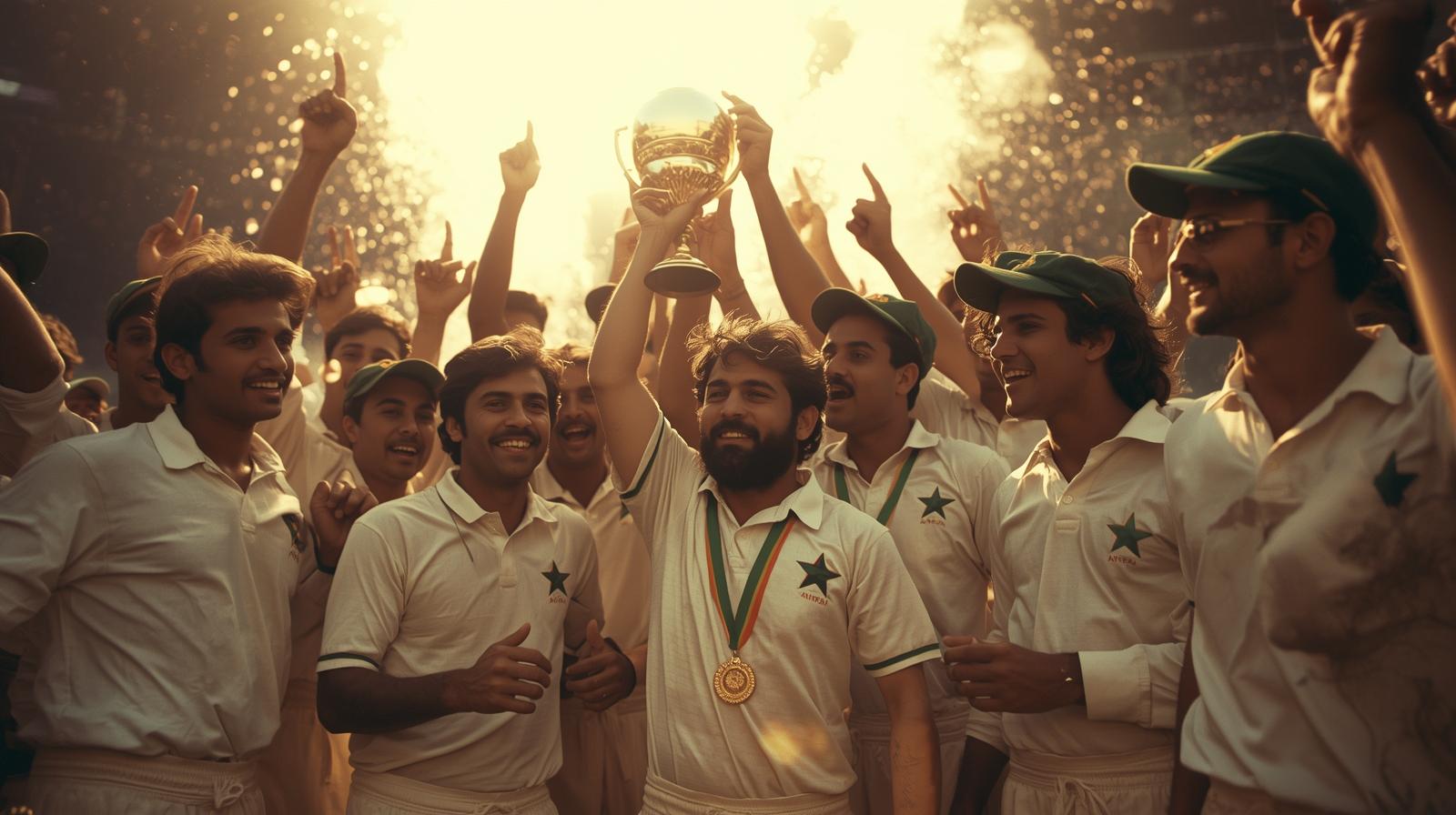Sports
1992 Cricket World Cup Pakistan Squad: The Journey to Glory
Published
4 months agoon
By
Admin
Introduction
The 1992 Cricket World Cup holds a special place in the hearts of millions of cricket fans. For Pakistan, it was more than just a tournament — it was a story of resilience, determination, and belief against all odds. Under the charismatic leadership of Imran Khan, Pakistan’s squad scripted history by lifting their first-ever World Cup trophy.
The Pakistan team of 1992 was not only talented but also filled with future legends who would go on to shape cricket for decades. The combination of experienced seniors and energetic youngsters turned the squad into a powerful force, despite initial struggles. This article takes you deep into the details of the 1992 Pakistan squad, their players, performances, and the unforgettable journey to World Cup glory.
Background of the 1992 Cricket World Cup
The 1992 edition was unique in many ways. Hosted jointly by Australia and New Zealand, it was the first World Cup to feature colored clothing, white cricket balls, black sight screens, and day-night matches. These innovations added a modern touch to the game and gave the tournament a fresh identity.
For Pakistan, the tournament began in a shaky manner. The team lost early matches and was written off by critics. But Imran Khan urged his team to play like “cornered tigers,” and this spirit transformed Pakistan into unstoppable champions.
Complete Pakistan Squad for the 1992 World Cup
The Pakistan squad included a mix of seasoned professionals and rising stars:
- Imran Khan (Captain, All-rounder)
- Javed Miandad (Vice-Captain, Batsman)
- Wasim Akram (Bowler/All-rounder)
- Waqar Younis (Bowler – injured, missed World Cup)
- Aamer Sohail (Batsman)
- Ramiz Raja (Batsman)
- Inzamam-ul-Haq (Batsman)
- Ijaz Ahmed (Batsman)
- Saleem Malik (Batsman)
- Moin Khan (Wicketkeeper)
- Rashid Latif (Reserve Wicketkeeper)
- Mushtaq Ahmed (Leg-spinner)
- Aaqib Javed (Fast bowler)
- Ejaz Ahmed Jr. (All-rounder)
- Zahid Fazal (Batsman)
Waqar Younis, unfortunately, missed the World Cup due to injury, but the remaining squad played as a tight unit to make history.
Key Players and Their Roles
Imran Khan – The Leader of “Cornered Tigers”
Imran Khan’s leadership was the backbone of the 1992 campaign. Despite being in the later stages of his career, his fighting spirit inspired the team. His famous tiger shirt during the semifinal and final became a symbol of Pakistan’s resilience. As an all-rounder, he contributed both with bat and ball and lifted the trophy as Pakistan’s most successful captain.
Javed Miandad – The Experience Factor
Javed Miandad was the most experienced batsman in the squad. Known for his cricketing brain and consistency, Miandad played crucial knocks throughout the tournament, guiding younger players and anchoring innings under pressure. His presence in the middle order gave stability to Pakistan’s batting lineup.
Wasim Akram – The Swing King
One of the biggest stars of the tournament, Wasim Akram showcased why he would later be called the Sultan of Swing. His devastating spells, particularly in the final against England, turned the game in Pakistan’s favor. His two wickets in consecutive balls during the final are still remembered as the turning point of the match.
Inzamam-ul-Haq – The Young Hero
A relatively unknown player before the World Cup, Inzamam-ul-Haq announced himself on the global stage during the semifinal against New Zealand. His blistering 60 runs off just 37 balls stunned the hosts and took Pakistan to the final. That innings made him an overnight star.
Aaqib Javed – The Young Pacer
At only 19 years old, Aaqib Javed shared the new-ball responsibilities with Wasim Akram. Though young, he bowled with heart and discipline, delivering crucial breakthroughs in several matches.
Mushtaq Ahmed – The Leg-spin Magician
Mushtaq Ahmed, just 19, was Pakistan’s surprise weapon. His leg-spin troubled batsmen on pitches in Australia and New Zealand. His ability to break partnerships added depth to Pakistan’s bowling attack.
Ramiz Raja – The Stylish Opener
Ramiz Raja provided steady starts at the top of the order. His half-century in the final ensured Pakistan had a strong total. His elegant batting style complemented aggressive players like Aamer Sohail.
Moin Khan – The Reliable Wicketkeeper
Behind the stumps, Moin Khan was sharp and reliable. He also played important cameos with the bat, contributing valuable runs in pressure situations.
Pakistan’s Journey Through the Tournament
Struggles in the Group Stage
Pakistan had a rocky start, losing to the West Indies, India, and South Africa. A washed-out match against England gave them an unexpected lifeline. With their campaign hanging by a thread, they needed to win all remaining matches — and that’s exactly what they did.
The Turning Point: “Cornered Tigers” Speech
After a series of losses, Imran Khan motivated his team with his famous “cornered tigers” speech. He urged them to fight back with aggression and belief. From that moment, Pakistan’s fortunes turned dramatically.
Semifinal vs. New Zealand
Facing an unbeaten New Zealand side in the semifinal, Pakistan pulled off one of their greatest wins. Inzamam-ul-Haq’s explosive batting and Mushtaq Ahmed’s clever bowling led Pakistan to a thrilling victory, securing their place in the final.
The Final vs. England
On 25th March 1992 at the Melbourne Cricket Ground, Pakistan faced England. Batting first, Pakistan posted 249 runs, with Imran Khan and Javed Miandad playing vital knocks. Wasim Akram’s fiery spell in the second innings — including his famous double strike — dismantled England’s batting. Pakistan bowled them out, winning by 22 runs and lifting their maiden World Cup.
Legacy of the 1992 Squad
The 1992 squad created a legacy that still inspires generations:
- First World Cup victory for Pakistan.
- Birth of legends like Inzamam-ul-Haq, Wasim Akram, and Mushtaq Ahmed.
- Imran Khan’s captaincy became a leadership model worldwide.
- The “cornered tigers” spirit became a national philosophy for resilience.
Cultural and Emotional Impact in Pakistan
The victory united the entire nation. Streets across Pakistan were filled with celebrations. For a country facing political and economic challenges, the World Cup win provided joy, hope, and pride. The 1992 squad became national heroes, and cricket truly became the heartbeat of the country.
Comparison with Other World Cup Squads
Unlike later squads that boasted star players in prime form, the 1992 squad had many young and inexperienced cricketers. But their ability to rise under pressure set them apart. The mixture of youthful energy and senior guidance was the perfect recipe for success.
Lessons from Pakistan’s 1992 Triumph
- Never lose hope: Even after a poor start, Pakistan showed that persistence pays off.
- Leadership matters: Imran Khan’s vision and belief transformed a struggling team.
- Team unity: Every player contributed — from seniors like Miandad to newcomers like Inzamam.
- Youth can shine under pressure: Youngsters played fearless cricket when it mattered most.
FAQ
Q1: Who was the captain of Pakistan in the 1992 World Cup?
Imran Khan was the captain and led Pakistan to victory.
Q2: Who was Pakistan’s star performer in the final?
Wasim Akram, with his all-round performance, was the standout in the final.
Q3: When did Pakistan win their first Cricket World Cup?
Pakistan won their first World Cup on 25th March 1992 in Melbourne, Australia.
Final Thoughts
The 1992 Cricket World Cup Pakistan squad will forever be remembered as the team that defied odds and created history. Led by Imran Khan, fueled by legends like Wasim Akram and Javed Miandad, and powered by young stars like Inzamam-ul-Haq, the squad embodied passion, resilience, and unity.
Their victory was more than just a sporting achievement — it was a cultural milestone for Pakistan. Even decades later, the story of the 1992 squad continues to inspire cricketers and fans across the world.

Graduations, Pouch Pizza, Purchase Games, and ZipperGitsFh: A Modern Digital Culture Story

Unlock the Thrill: Why Independent Casinos Sites Are Better

The End of Forms: Why No-Registration Casinos Are Taking Over

The Best Online Casinos: Why Experience Matters More Than Luck

Understanding “inurl:home.htm intitle:1766” and Why People Search It

Home Gym Meteorology Shop: Evaluating Fitnara for Smart Fitness Choices

The Future of Gaming is in Your Hands: Why PayByMobile Casinos Change Everything

Discover the Elite: Why the Top 50 Online Casinos UK Set the Standard

Unleash the Thrill: Discover the Ultimate Experience at Basswin Casino

The Gold Standard: Defining the Best Online Casinos in the UK

The Gold Standard: Defining the Best Online Casinos in the UK

Discover the Elite: Why the Top 50 Online Casinos UK Set the Standard

Unleash the Thrill: Discover the Ultimate Experience at Basswin Casino

Fresh Spins & Big Wins: Unlocking the Best New Casino Bonuses in the UK

Home Gym Meteorology Shop: Evaluating Fitnara for Smart Fitness Choices

The Future of Gaming is in Your Hands: Why PayByMobile Casinos Change Everything

The Best Online Casinos: Why Experience Matters More Than Luck

Understanding “inurl:home.htm intitle:1766” and Why People Search It

The End of Forms: Why No-Registration Casinos Are Taking Over

Unlock the Thrill: Why Independent Casinos Sites Are Better

Graduations, Pouch Pizza, Purchase Games, and ZipperGitsFh: A Modern Digital Culture Story

Unlock the Thrill: Why Independent Casinos Sites Are Better

The End of Forms: Why No-Registration Casinos Are Taking Over

The Best Online Casinos: Why Experience Matters More Than Luck

Understanding “inurl:home.htm intitle:1766” and Why People Search It

Home Gym Meteorology Shop: Evaluating Fitnara for Smart Fitness Choices

The Future of Gaming is in Your Hands: Why PayByMobile Casinos Change Everything

Discover the Elite: Why the Top 50 Online Casinos UK Set the Standard

Unleash the Thrill: Discover the Ultimate Experience at Basswin Casino









